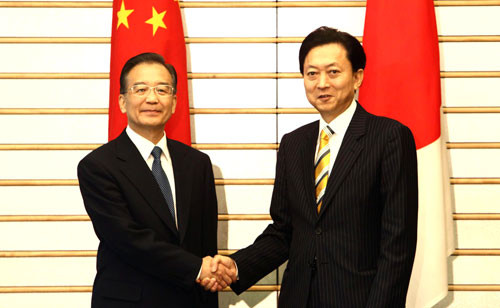Latest News
China, Japan highlight co-op on key issues
(Xinhua)
Updated: 2010-05-31 20:59
 |
Large Medium Small |
|
 Visiting Chinese Premier Wen Jiabao (L) and Japanese Prime Minister Yukio Hatoyama shake hands during their talks in Tokyo, May 31, 2010. [Xinhua] |
TOKYO - China and Japan on Monday reached consensus on issues including the East China Sea, food safety and maritime communication to further boost bilateral ties.
Visiting Chinese Premier Wen Jiabao and Japanese Prime Minister Yukio Hatoyama held talks in Tokyo and agreed to re-establish a hot line between the premiers of the two countries.
During their talks, Wen said that the world economy, though in a complex and difficult situation, is recovering and that the world is undergoing far-reaching changes. Sound China-Japan relations are not only in the interests of the two countries, but also of vital importance to reinvigorating the Asian economy and building on world harmony and sustainable development.
"China sees Japan as a strategic partner, not a competitor or a rival. The two neighbors should view each other as partners so as to have peaceful coexistence and long-lasting friendship," Wen said.
He added that the two sides should strengthen high-level communication on major issues, continue to work on implementing principled consensus on the East China Sea issue, avoid confrontation and conflicts to make the East China Sea "a sea of peace, cooperation and friendship."
On economic affairs, Wen said the foundation of economic cooperation between China and Japan is solid. The two countries should make the best of the high-level economic dialogue and other mechanisms to enhance macroeconomic coordination, and launch a number of major cooperation projects in green economy, energy and environment, and circular economy.
"Signing the food safety cooperation framework agreement offers the two countries a good chance to promote cooperation in food production and trade," the premier said.
Wen also said friendship between the two peoples serves as the basis of amicable relations between Japan and China. The two nations should continue to nurture this friendship by promoting communication and exchanges among the youths, and exchanges in culture, tourism and media, and between cities and civil groups.
China will invite 1,000 youths from Japan to the World Expo in Shanghai, and invite Japanese rescuers to revisit Wenchuan of Sichuan province to see the rebuilding process in the area leveled by a major earthquake in May 2008. The two countries also decided to arrange exchange of visits by people working in mass communication and social sciences.
Hatoyama said the Japanese government attaches great importance to the strategic mutually beneficial relations with China and is willing to communicate with China on major issues to further improve understanding and trust.
Hatoyama said he is very keen on travelling to Shanghai to attend the national pavilion day of Japan in June and believed the Shanghai Expo will greatly boost friendly cooperation between the two countries.
The two leaders also discussed the situation on the Korean Peninsula.
Before their talks, Hatoyama hosted a welcome ceremony for Wen, who is on his second visit to Japan after the first one in 2007.
Also on Monday, Wen met with Takahiro Yokomichi and Satsuki Eda, speakers of lower and upper houses of the Japanese Diet respectively.
Wen said parliamentary exchanges are a vital part of Japan-China ties. China's National People's Congress (NPC) has established an exchange mechanism with the two houses of the Diet. The NPC and the Diet should further improve dialogues to play a positive part in boosting Sino-Japanese relations.
Premier Wen arrived here on Sunday for a three-day official visit. Japan is the second leg of his four-nation Asian tour, which has taken him to South Korea. He will also visit Mongolia and Myanmar.




